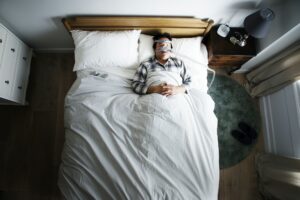How do you fix sleep apnea?
Sleep apnea is a common yet serious sleep disorder that affects millions of people worldwide. It's characterized by repeated interruptions in breathing during sleep, leading to health complications if left untreated.
The good news is that various sleep apnea treatments are available today. The options are diverse and continually evolving, ranging from traditional therapies like Continuous Positive Airway Pressure (CPAP) to newer, innovative treatments.
This article aims to provide a comprehensive guide to treating sleep apnea. We'll explore conventional and alternative treatments that do not involve CPAP.
This guide will offer valuable insights, whether you're a patient seeking solutions or simply interested in the latest advancements in sleep therapy. Stay tuned as we explore the world of sleep apnea treatments.
Understanding Sleep Apnea
Sleep apnea is a condition where breathing repeatedly stops and starts during sleep. This disruption in breathing can lead to poor sleep quality and excessive daytime sleepiness, among other symptoms.
Treating sleep apnea to alleviate these symptoms and prevent potential health risks is crucial. Untreated sleep apnea can lead to serious complications such as heart disease, high blood pressure, and even type 2 diabetes.
Traditional Treatments for Sleep Apnea
A continuous positive airway pressure (CPAP) machine is the most common sleep apnea treatment. This device delivers constant airflow through a mask worn during sleep, keeping the airway open.
However, only some find CPAP comfortable or practical. Due to the machine's noise, some may experience dryness, skin irritation, or difficulty sleeping.
Despite these challenges, CPAP remains a reliable treatment for many. It's often the first line of defense against sleep apnea.
CPAP: The Standard Approach

CPAP therapy involves wearing a mask over the nose and mouth during sleep. The machine connected to the mask pumps air into the airway, preventing it from collapsing.
While effective, CPAP requires consistent use to be beneficial. Some may find this challenging, as the machine can be cumbersome and uncomfortable.
However, with proper fitting and adjustments, many people find relief with CPAP therapy. It's a tried-and-true method, but it's not the only option available.
Alternative Treatments for Sleep Apnea Without CPAP
For those who find CPAP challenging, there are alternative treatments. These include oral appliances, lifestyle changes, and positional therapy.
Oral appliances are custom-made devices that adjust the position of the jaw or tongue during sleep. They can help keep the airway open, reducing sleep apnea symptoms.
Lifestyle changes, such as weight loss and avoiding alcohol, can also help manage sleep apnea. Positional therapy, which involves changing sleeping positions, can be effective for some people.
Oral Appliances for Sleep Apnea
Oral appliances are a popular alternative to CPAP. They are custom-fitted by a dentist or orthodontist and worn during sleep.
These devices move the lower jaw forward or hold the tongue in place. This helps keep the airway open, reducing the occurrence of apneas.
Lifestyle Changes and Positional Therapy
Lifestyle changes can have a significant impact on sleep apnea. Losing weight, quitting smoking, and avoiding alcohol can all help reduce symptoms.
Positional therapy involves changing sleeping positions to improve breathing. For example, sleeping on one's side instead of the back can help keep the airway open. This is particularly effective for people with positional sleep apnea.
Newest Sleep Apnea Treatments
New treatments are continually being developed to improve sleep apnea management. These include hypoglossal nerve stimulation, drug therapy, and adaptive servo-ventilation.
- Hypoglossal nerve stimulation involves implanting a device that stimulates the nerve, controls tongue movement, and keeps the airway open.
- Drug therapy is still in the research phase, but it holds promise for future treatment.
- Adaptive servo-ventilation (ASV) is a newer type of airway pressure device that can be used for complex sleep apnea.
Emerging Technologies and Therapies
Emerging technologies are also helping to treat sleep apnea. Telemedicine and remote monitoring are becoming more common, allowing better condition management.
Like hypoglossal nerve stimulation, upper airway stimulation devices are also being explored. These devices stimulate the muscles that open the airway, potentially reducing apneas.
The Importance of a Custom Treatment Plan
Every individual's sleep apnea condition is unique, requiring a personalized treatment plan. This plan should be based on the severity and type of sleep apnea and the patient's lifestyle and preferences.
Consulting with a sleep specialist is crucial in developing this plan. They can guide the most suitable treatments and monitor progress through regular follow-ups and sleep studies.
Conclusion: Taking the Next Steps
Understanding and treating sleep apnea is vital for maintaining good health and quality of life. Therefore, exploring all available treatment options, including the latest ones, is essential.
Remember, the journey to better sleep health begins with a single step. Consult with a sleep specialist to start your personalized treatment plan today.
Here at Houston Sleep Associates (HSA) in Houston, TX, we are passionate about quality sleep. Our years of experience ensure that each patient receives the best care customized to their unique needs and desires!
Schedule a consultation in Houston, Texas.
If you've ever considered improving your sleep, see what we offer. Schedule a consultation at Houston Sleep Associates and experience sleep's warmth, professionalism, and transformative power. Your journey to a brighter, more confident day begins with a single step. Let's take it together!
Other Related Sleep Apnea Articles:
1. How to Keep My Airway Open without a CPAP Machine? (houstonsleepassociates.com)
2. Oral Appliance Therapy to Stabilize Airway in Respiratory Care (houstonsleepassociates.com)
3. Do mouth pieces work for sleep apnea? - Houston Sleep Associates
4. Improving Quality of Rest: The Benefits of Oral Appliances (houstonsleepassociates.com)
5. Improving Sleep Apnea: The Best Sleeping Position Revealed (houstonsleepassociates.com)
6. The Best Snore Stoppers for You - Houston Sleep Associates
7. Improving Sleep Quality with Mouth Guards - Houston Sleep Associates
8. Top Mouth Devices for Sleep Apnea (houstonsleepassociates.com)
9. The Benefits of Using Dental Devices (houstonsleepassociates.com)
10. Understanding the Science Behind Sleep Apnea Mouth Guards (houstonsleepassociates.com)

